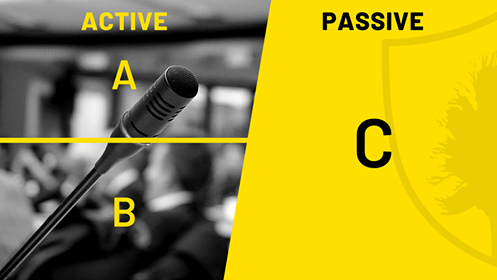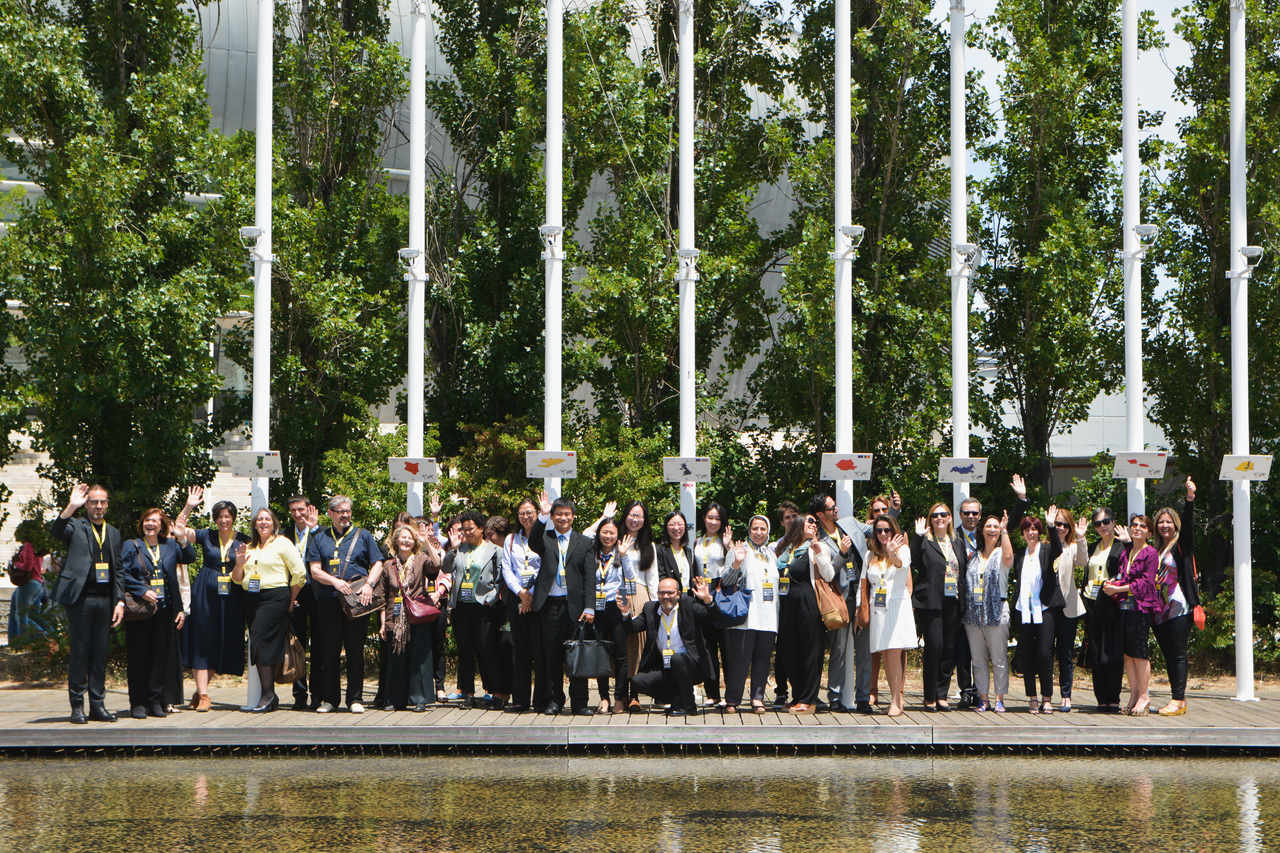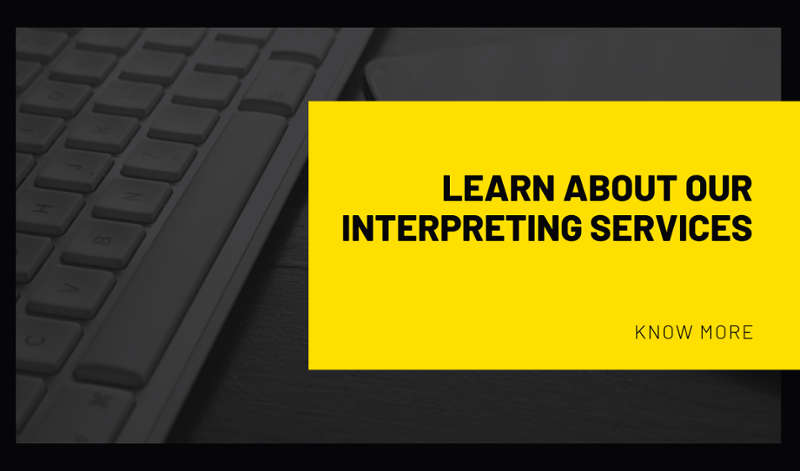AP Portugal Tech Language Solutions' participation at the World Conference of Ministers Responsible for Youth and Youth Forum, which took place in Lisbon last June, was the perfect opportunity to document and acknowledge the importance of the Project Manager and the fundamental role of the Consultant Interpreter.
In this live analysis, two points immediately stood out:
- an event of this scale requires careful and thorough management so that nothing is missing when the speeches begin;
- the planning starts well before the event.
As soon as we received the project request, AP Portugal Conference Services' Project Manager, assigned to the event, immediately began an array of tasks. Namely:
- recruiting the team of interpreters;
- ensuring their availability;
- gathering all available documents;
- making sure that everyone is set to arrive at the venue on time;
- ensuring all the conference interpreters are prepared and have adequate linguistic skills to meet the event's needs;
- liaising between the event organiser, the audiovisual teams and the interpreting teams.
Below, we describe, one by one, the relevant steps of this process and the roles the Project Manager and the Consultant Interpreter play.
Recruiting the team of interpreters
This World Conference of Ministers Responsible for Youth and Youth Forum, like all the events promoted by the United Nations - UN, required the 6 official languages of the organization. Namely:
- Arabic - AR
- Mandarin - ZH
- English - EN
- French - FR
- Russian - RU
- Spanish - ES
To ensure total participation in the conference, Portuguese - PT, the official language of the country hosting the event, was added.
As such, the most common combinations of multilingual events in Portugal, namely PT<>EN, PT<>ES, PT<>FR, were provided by AP Portugal Conference Services's own conference interpreters, who not only live in Portugal but are also part of our team. As for those combinations less frequently requested in Portugal, we had to resort to our international network of conference interpreters.

How to classify working languages?
Interpreters have to be able to translate a message from one language to another very quickly, especially for simultaneous interpreting. In other words, they have to understand quickly, think fast and speak fluently.
As we have stated in other articles on our blog, interpreters can express themselves better and more fluently in some languages than in others. As such, a distinction is made, Namely:
- Languages that they speak fluently are called active languages.
- Those that they understand perfectly, but don't speak as fluently, are called passive languages.
Interpreters' working languages are classified in three categories - A, B, C:
- The "A" language is the interpreters' native language (or equivalent). They work into this language from all their other working languages, both in consecutive and simultaneous interpreting. This is the language that they speak the best and in which they are able to easily express even complicated ideas. This is therefore an active language for the interpreters.
- A "B" language is a language in which the interpreters are perfectly fluent, but which isn't their native language. Interpreters can work into this language from one or more of their other working languages, but may prefer to do it in a certain interpreting method, most frequently "consecutive" as it's not as quick. This is also considered as an active language for the interpreters.
- A "C" language is a language that the interpreter understands perfectly, but does not work into. They interpret from this language (or languages) into their active ones. Therefore, this is a passive language for the interpreters.
Resorting to relay interpreting
It should be noted that Conference Interpreting (also known as Simultaneous Interpreting or Simultaneous Translation) is the most commonly used interpreting method for large conferences, to avoid affecting the event's duration.
At an event with a large variety of languages, conference interpreters have had to resort to relay interpreting to meet the event's needs, as they did not master all the required languages. Relay interpreting is another name for indirect interpreting, i.e. instead of directly translating from the source language to the target language, the interpreter works from another colleague's simultaneous interpreting.
Relay interpreting is another name for indirect interpreting. Here the interpreters work from another colleague's simultaneous interpreting.
In an ideal world, we would provide all language pairs to avoid resorting to relay interpreting, but this is not always possible, as we have seen here.
During this stage, the Project Manager identified the required language pairs for the best simultaneous interpreting and formed the interpreting teams by language pairs. In turn, the Consultant Interpreter began his job here, making sure that all the conference interpreters filled the necessary requirements. This assessment was carried out with an interview with the ZH<>EN and ZH<>PT interpreters (by phone or video call), to determine their language skills in EN and PT respectively, as these would be the "pivot" languages for the relay interpreting. Did you know that there's an ISO code to represent the names of languages?
Travel and accommodation
Having formed the teams, we needed to ensure that the conference interpreters would arrive at the venue on time. AP Portugal Tech Language Solutions relied on conference interpreters who travelled to Lisbon from all over the world, from Morocco to Russia to Ukraine. The Project Manager's role was to arrange flights from the various destinations and transfers from the interpreters' accommodation to the event. The distances and travel times between the destinations had to be calculated, details that could be overlooked, but which are essential in managing the project and which the Project Manager cannot neglect.
For some of the conference interpreters, this was also their first time in Portugal and an opportunity to visit the magnificent city of Lisbon. More than just helping to transcend language barriers, conference interpreting also encourages cross-cultural exchange and the opportunity to share unforgettable experiences.
Food, diets and cultures
Among such great diversity of cultures and traditions, it's important to consider the dietary restrictions of the conference interpreters in our team when arranging meals. With such diverse backgrounds as Morocco, China, Russia and Ukraine, ensuring that everyone is comfortable with what's on offer is fundamental. These restrictions can be due to health reasons, religious beliefs or life style, and it's up to the Project Manager to make sure they are all respected.
Prior inspection of the venue and equipment
During this stage, the Consultant Interpreter visited the event venue, the Altice Arena, at Parque das Nações, in Lisbon, to assess the conference interpreters' working conditions and to arrange the required accreditations for their participation. At a maximum security event such as this, with the attendance of prominent dignitaries from various countries, we needed to pass several security procedures, including bag searches and accreditation checks.
With 42 conference interpreters for the conference's various parallel sessions, we had to set up an interpreting centre to accommodate all the interpreters and the technical equipment. Here the Consultant Interpreter, working with the audiovisual team, tested all the equipment. In practice, this involved checking the sound quality, the output from the microphones in the conference rooms to the interpreting consoles, as well as the output between consoles in the various booths, to ensure the relay interpreting.
The Consultant Interpreter also checked that the facilities provided the appropriate comfort conditions in terms of soundproofing, booth temperature, lighting, water supply and internet access.
Relevant information and documents
At official events such as this, where political agendas and plans for international consultation are debated, guaranteeing confidentiality is crucial. At this point, the Project Manager streamlined confidentiality agreements to present to the event organiser.
Once the confidentiality requirements were ensured, the Project Manager facilitated access to the information available at the time the teams were defined. The programme and agenda, the participants in attendance, the list of speakers, their titles and positions, as well as the conference website and other relevant links were conveniently shared with the conference interpreters so they could start their work before the conference begins.
Providing as much documentation as possible in advance is vital for the quality of the conference interpreting.
Prior preparation is crucial to guarantee the quality of their communications. However, not all documentation is made available more than 24 hours beforehand. Here, the Consultant Interpreter, with the organiser, ensured that all the written documents provided by the conference speakers, especially written speeches, were available. This is a fundamental step in this process. Providing as much documentation as possible in advance is vital for the quality of the conference interpreting. The conference interpreter will do a better job and will thus be able to ensure greater accuracy and better transmission of the message.
Until the beginning of the conference, it's up to the Consultant Interpreter to ensure that any last minute material is available. This could be digital presentations, the speakers' notes, the presidents' notes, names and titles of attendees, especially at events like this, with VIP participants, prominent dignitaries, presidents and moderators attending.

Friendship and family photo
We could not miss this opportunity given by the World Conference of Ministers for Youth and Youth Forum 2019 to forge closer ties with old colleagues, meet new colleagues and make friends. During lunch, with a get-together of members of our interpreting team, the Consultant Interpreter became our MC, making sure that everyone enjoyed this moment of rest. It was time to share experiences and taste new delicacies, taking home a slice of the cultural diversity that such occasions provide.
Of course we had to take a family photo. A souvenir of a unique moment with a magnificent background, the former Utopia Pavilion.
This text was not written by a native English speaker, but by a language lover. However, all our language services are always provided by native speakers.
ABOUT US
AP PORTUGAL - Tech Language Solutions is a Portuguese translation company certified by the ISO 17100 International Quality Standard. The company offers a wide range of language services, which include translation (TEP), post-editing machine translation (PEMT), transcription, desktop publishing and subtitling, voice talent, software and website localisation technology, SEO and consulting. It invests enthusiastically in the development of partnerships and cooperation anywhere in the world where your organization may need a partner for the African, Brazilian and European Portuguese language.
Related Articles:
In an increasingly multilingual world, communication must be instantaneous, accurate, and...
Related Articles:
Effective communication is the foundation of success in international business, legal...
Related Articles:
In today's globalised and digitally connected world, accessibility and inclusion are no...






Comments